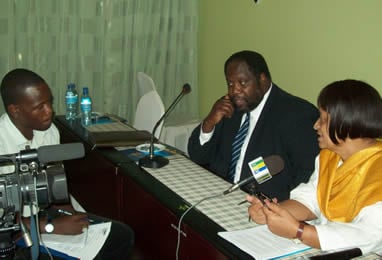June 2010
Delegations Praise, Suggest Improvements for African Elections
|

Keith Jennings, NDI's Southern and East Africa regional director, and Ambassador Nora Schimming-Chase of Namibia present the delegation's findings in Tanzania.
|
|
Elections do not begin and end on election day. Successful polls require months of pre-election preparations by candidates, civil society, election commissions and domestic and international observer groups. Successful elections also require transparent counting procedures, a timely and fair adjudication of electoral complaints and a peaceful transfer of power.
In the pre-election periods in Tanzania and Guinea, NDI fielded delegations that assessed conditions and made recommendations to improve transparency, participation and fairness in upcoming elections.
In Tanzania, elections slated for October 2010 will be a milestone in the country's democratic development. The NDI delegation released a statement praising Tanzania's electoral process for its innovation and reform, but pointing out several aspects of the process that need to be strengthened. The delegation focused especially on a July 31 referendum that could enable Zanzibar to form a government of national unity. It also focused on the Election Expenses Act, which could exacerbate the resource imbalance between the government and opposition parties, and the voter registration process, which it said still requires significant improvements. Read more»
In Guinea, where the military junta is preparing to hand over power to a civilian government after the country's June 27 presidential election, members of the NDI delegation were optimistic that the election would be conducted peacefully. Their optimism was merited when the voting proceeded in what was initially seen as a largely peaceful and fair election. In a communiqué released prior to the vote, the delegation said, "The electoral campaign is being held without clashes and major incidents." Areas cited as needing improvement were the election commission's communications with the public as well as Guinea's security forces' role in the electoral process. Read more»
These two elections, in addition to upcoming polls in Rwanda, Kenya and Niger, underscore the value of the guidelines, recommendations and a sample of best practices included in a new report from last year's Ghana colloquium on African elections. The gathering was attended by more than 100 participants from 25 African nations. The report is available in both English and French.
|
|
In an effort to curb electoral irregularities in Uganda, DEMGroup and the Citizens Coalition for Electoral Democracy (CCEDU), both domestic election monitoring organizations, are using technology.
They have put in place a citizen hotline that Ugandans can use to call or text in concerns about the integrity of the electoral process. The comments are being collected, organized and checked out by DEMGroup and CCEDU monitors and digitally mapped on a public website to add transparency to the voting process.
The project is being conducted in partnership with NDI.
Read more»
As the political situation in Serbia has stabilized, attention has shifted to operation of its parliament and the lawmakers' responsibilities to constituents. Rebecca Shoot, a resident program officer in NDI's Belgrade office, discusses the Institute's work helping parliamentarians engage with the electorate.
Read more»
The efforts of civil society organizations to monitor and assess the work of legislatures was the subject of a recent meeting of representatives of parliamentary monitoring organizations (PMO) at the Sixth Assembly of the World Movement for Democracy in Jakarta, Indonesia.
The findings of a project to identify and map PMOs around the world were presented at the conference, as was an introduction to the AGORA Portal for Parliamentary Development, an online resource for sharing parliamentary best practices.
Read more»
You voted for your favorites, now see who won! The Democracy Video Challenge has announced its six winning filmmakers— from Ethiopia, Indonesia, Spain, Iran, Nepal and Colombia — who earned the most votes for their three-minute videos completing the phrase "democracy is..." The six will now visit New York, Washington, D.C., and Los Angeles, where they will meet with representatives from government, democracy and other nongovernmental organizations, and the film and television industries.
Watch the winning videos»
|
|
Women's meaningful participation in politics affects both the range of policy issues considered and the types of solutions that are proposed. In places such as Timor-Leste, Croatia, and South Africa, an increase in the number of female lawmakers has resulted in more legislation related to domestic violence, inheritance and security.
NDI President Kenneth Wollack testified about these gains at a House Foreign Affairs subcommittee hearing on "Women as Agents of Change: Advancing the Role of Women in Politics and Civil Society."
Read more»
Read Wollack's testimony»
In Cambodia, members of the National Assembly have few chances to interact with constituents, and citizens rarely have an opportunity to express their views to their elected representatives in Phnom Penh. To address these challenges, NDI is expanding its constituency dialogue program as part of a five-year USAID-funded effort called Accountability in Governance and Politics. The dialogues are attended by 400 to 600 citizens and are similar to town hall meetings. Citizens can speak to and ask questions of their elected representatives.
Read more»
Efforts in the Balkans to turn the page on a troubled past and look to democratic rule as a foundation for political stability are having an effect, according to Robert Benjamin, NDI's regional director for Central and Eastern Europe. In a recent talk, he discussed the outlook in the Western Balkans — Albania, Bosnia-Herzegovina, Croatia, Kosovo, Macedonia, Montenegro and Serbia — and concluded that despite challenges the region is making real progress toward peace, stability and democracy.
"My optimistic message is that the region is stabilizing in ways we've never seen before," he said.
Read more»
Read Benjamin's full remarks»
|